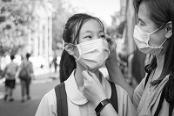Centre for Educational Research and Innovation - CERI
Spotlights - Trends Shaping Education
| |
Trends Spotlight # 24: Think green: Education and climate change On a daily basis, a deluge of academic studies, reports and news tell us that the Earth’s ecosystem is in danger. They further warn that we need more than just information to address the climate crisis, protect the environment, and promote a sustainable way of living. We need action. Education plays a pivotal role in raising awareness and sensitivity about the environment. It must provide the foundational knowledge and skills to identify and resolve environmental challenges, and shape attitudes and behaviours that lead to both individual and collective action. |
 |
Trends Spotlight # 23: All the lonely people: Education and loneliness Everyone feels lonely some of the time. However, chronic loneliness can impair learning, affect physical and mental health, and is even linked to early death. Loneliness is thus not only a personal matter; it is a public health concern. Education can help forge connections across social groups, strengthen social skills and provide access and opportunities Blog: How can education help fight loneliness
|
 |
Trends Spotlight # 22: Love & let live: Education and sexuality School-based sexuality education tends to focus on sexual and reproductive health. Addressing the social contexts of sex and relationships in a positive and inclusive manner is also key. Blog: It’s a pleasure: Improving sex and relationships education |
 |
Trends Spotlight # 21: Coronavirus special edition: Back to school The COVID 19 pandemic has disrupted education around the world. As the first shock passes, planning is taking place on two timescales: the short-term challenges in the return to school, and the challenges over the next 18-24 months as systems work to build resilience and adaptability for the future. Blog: Responding to coronavirus: Back to school
|
 |
Trends Spotlight # 20: Money matters: Ensuring financial well-being Strong basic literacy and numeracy skills are important foundations for making sound financial decisions. Curriculum design, pedagogical methods and stakeholder involvement can all be harnessed to build student financial knowledge and well-being.
|
 |
Trends Spotlight # 19: Crime & Punishment Keeping a good disciplinary climate is a key to student learning and well-being. Disciplinary norms need to be clearly established, and applied fairly and consistently. Yet, strictness alone cannot optimise student outcomes: students need support and understanding. Blog: The bitter with the sweet: Keeping discipline in schools and classrooms |
 |
Trends Spotlight # 18: Play! Playful experiences provide us with the opportunity to engage with others and learn in enjoyable ways. Recognising and building on the power of playfulness and play can be a way to support more meaningful educational experiences for all, life-wide and lifelong. |
 |
Trends Spotlight # 17: A Healthy Mind in a Healthy Body Good health is a benefit in many domains, such as work, studies or social relationships. Fostering a sound knowledge on healthy habits and the implications of risk-taking behaviours is a key to shaping societies with healthier lifestyles.
|
|
|
Trends Spotlight # 16: Writing in a Changing World Written communication has been thousands of years in the making, but in recent decades the way we write, the skills we use and the role writing plays in the world have all changed. This has important implications for education and skills. Blog: How technology is enabling new ways of writing
|
 |
Trends Spotlight # 15: A brave New World: Technology and Education Rapid technological advances can have an impact on personal, social and professional development. Implications for education include changes in the demand for knowledge and skills as well as expanding possibilities for teaching and learning. Blog: How can technology support teaching and learning more effectively? |
 |
Trends Spotlight # 14: Good vibrations: Students’ well-being Over the past century, technological development and better access to services has resulted in significant improvements to quality of life. Despite this, however, levels of stress, anxiety and depression are rising. Education has a direct role in shaping individuals’ well-being. Blog: Why schools should pay more attention to students' mental health and well-being |
 |
Trends Spotlight # 13: Citizens with a say A well-functioning democracy relies on the knowledge, skills and engagement of its citizens as well as good institutional design. Empowering citizens to understand their rights and fully participate in their societies is part of the mission of schools in all OECD countries. Blog: Citizenship and education in a digital world
|
 |
Trends Spotlight # 12: Neurodiversity Diversity in the classroom includes differences in the way students’ brains learn, or neurodiversity. Neurodevelopmental disorders such as autism spectrum disorder (ASD) and attention deficit hyperactive disorder (ADHD) affect increasingly large numbers of students. Education systems must work to meet the needs of these students and ensure that all types of learners thrive at school and beyond. Blog: Different, not disabled: Neurodiversity in education
|
 |
Trends Spotlight # 11: People on the Move International mobility is on the rise, and the growing number of people coming and going across borders leads to increasingly diverse communities. Education has an important role to play in developing the competencies required for our increasingly global world. Blog: People on the move: growing mobility, increasing diversity |
|
Trends Spotlight # 10: Globalisation of Risk Our world is becoming increasingly interconnected. Global risks such as financial crises, cyber risks, pandemics and climate change all require a coordinated international response. Education can play a role in preventing and mitigating these risks by building resilience and developing the responsible and sustainable behaviours needed for a secure, global future. Blog: Risky Business |
|
 |
Trends Spotlight # 9: Country Roads Quality rural education is important for individual growth and social cohesion as well as regional economic productivity and innovation. Blog: Country Roads: Education and Rural Life |
 |
Trends Spotlight # 8: Mind the Gap As inequality both impacts education and is impacted by it, it is important to better understand how best to help ensure that all students, irrespective of social background, succeed in school and beyond. |
|
Trends Spotlight #7: Gender Equality Education plays an important role in ensuring that women and men have the same opportunities in their personal and professional lives, through formal schooling, shaping attitudes and transforming behaviours. Yet old stereotypes die hard, and gender still plays a role in a number of ways. This Spotlight takes a look at the issues both in society and in the educational field itself. |
|
 |
Trends Spotlight #6: Modern Families Families in the OECD are changing. The nuclear family – mother and father, married with children – is becoming less common. The number of reconstituted and single-parent households is rising, families are becoming smaller and individuals are deciding to have children later in life, or not at all. |
 |
Trends Spotlight #5: Infinite Connections ICT has influenced almost all aspects of our lives and has changed the way we communicate, work and socialize. Education plays a key role in ensuring that everyone can reap the benefits of our technology-rich world, as well as help mitigate some of the risks. |
 |
Trends Spotlight #4: Think Green Education plays a crucial role in raising awareness of environmental challenges and shaping the attitudes and behaviours that can make a difference. For basic education as well as vocational education and training, policy measures such as work-based learning and the provision of better career guidance can be powerful tools to strengthen the link between skills development and the green-growth agenda of countries. |
 |
Trends Spotlight #3: Urban Life The rise of urbanisation poses both opportunities and challenges for education – most notably, in developing policies that will ensure that education thrives in tandem with increasing urbanisation. Blog: The urban paradox |
 |
Trends Spotlight #2: Body and Society The growing rate of obesity is one of the most significant health trends in OECD countries and increasingly, in Brazil, Russia, India and China, the “BRIC” countries. Perhaps surprisingly, this health trend is also strongly linked to lower educational attainment – both as a cause and as an effect. |
 |
Trends Spotlight #1: Ageing Societies Countries across the OECD are in the midst of a rapid demographic transformation. Average life expectancy across OECD countries has risen from 69 years in 1970 to an average of 79.7 years in 2010. Countries where life expectancy was once low, such as Turkey, are rapidly reaching the OECD average. Indeed, by 2100, the median age across all OECD and BRIC (Brazil, Russian Federation, India and China) countries is forecasted to reach 45 years. As the average age increases, so too does the proportion of the elderly (> 80 years). Blog: Our ageing societies |
Related Documents